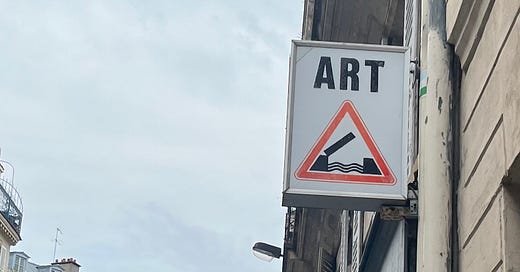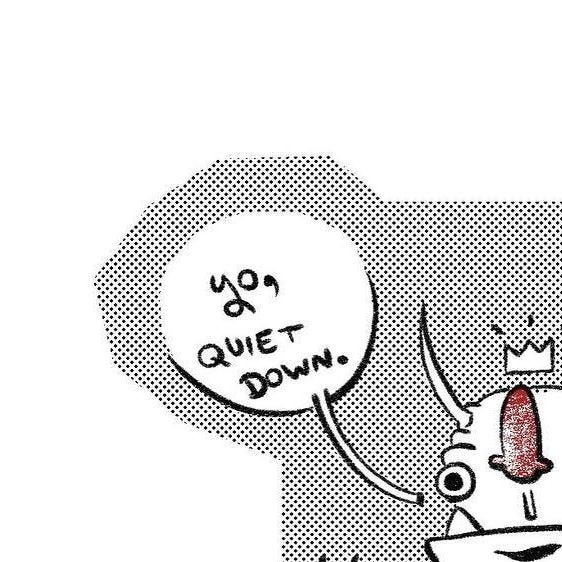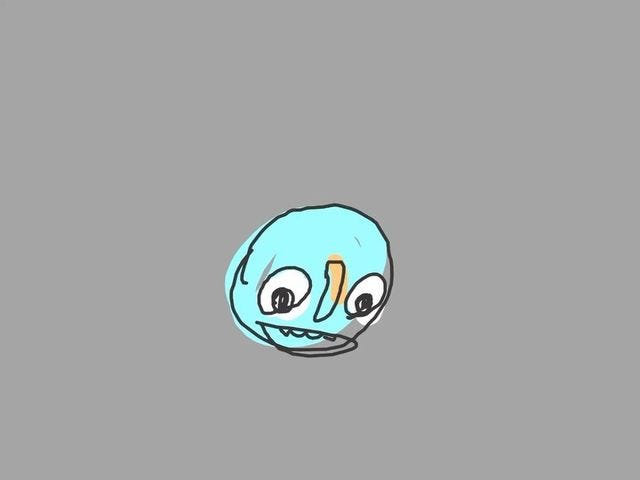I regret to inform you that you actually are creative, too. 🙈
🧠 Everybody wants a great idea and nobody wants to work for it.
Living and working as a creative person can feel like you're being pulled in a dozen different directions all at the same time. Vision vs experience, authenticity vs professionalism, efficiency vs detail and refinement, money vs personal fulfillment – the paradoxes inherent to a life where you try to commercialize something very core to your being are plentiful and all-encompassing. But the one thing that I think I have always struggled with the most is the internal pull between meaning and meaninglessness.
At various points in my life I have swung between seeing myself as an artist with something to say, and an artist who “just makes fun stuff” that has no deeper meaning. In those moments of shallowness, part of me would try to appeal to some kind of righteous simplicity that is in opposition and rebellion against elite, alienating art. The struggle I was caught in felt (in the moment) like one between creating establishment art and art for the people - art that we can all “get.”
The caption of this instagram post is “This is important work.” It’s deliberately sarcastic and transparently trying to hide the fact that I kind of *do* think this is important work. The thing I probably should have written here is “I was trying some new brushes in a drawing app and was really surprised by how much I like this drawing – I think it turned out nicely even though I wasn’t trying to do much with it other than play with line quality and textures.”
That’s obviously not the truth, though. People outside of establishment art spaces connect with meaningful art all the time. I realize now with some hindsight that my "meaningless" art represented something else.
The truth is that making meaningless art, for me, was really just the ebbing and flowing of self-consciousness. At times I have a strong appetite for being open and digging into what I want to say, while at other times I’m left feeling vulnerable and wanting to protect myself from my own self-expression. And I'm not just talking about making serious or emotionally vulnerable art – I'm just talking about making art that's trying to be about anything at all.
“Oh, don’t judge me and my thoughts based on that drawing – it doesn’t really mean anything anyways.”
This post is more recent, and more honest. These animations were about exploring motion and process in the app Looom, and I felt like they all turned into really interesting animations. That’s what they’re about: the joy and discovery of embracing a new tool and process.
Core to this is that making art is embarrassing. If you’re lucky, you can push through the pain of it and someone on the other side can validate you by saying that what you did is good or important or meaningful or cool or fun. The process was embarrassing, but you don’t need to feel bad about it because what you expressed was, in some way, well received.
At its worst, though, no one reacts at all. You stand up on the table, you sing your song from deep in your heart, and nobody listens and nobody cares and you have to slowly lower yourself to the floor, look around to see who noticed what you just tried to do, and sit back down to rejoin the class.
It’s really fucking embarrassing.
I’m starting to realize that those of us who call ourselves "professional artists" (and I really mean any creative profession – from illustrator to interior designer, music producer to the guy animating lower-third transitions for local news stations), we don’t get paid for our art — we get paid to be human shields for other people’s self-expression. We take the blows of embarrassment while our clients try to figure out what it is that they want to say. We shield our clients from their own truths and their own beliefs. We create a safe space for them to have a dumb idea, because they can always blame it on us. I don't want to sound bitter about that – that's the job and to me that particular aspect of it can be incredible fulfilling. But I'm becoming less comfortable with the fact that we aren't speaking honestly about that being what we do.
The frustrating thing is that everyone has something to say but nobody wants to do the work. Everyone wants to sing their song, but they feel safer when they just play a recording of someone else loudly in their car and drown out their own voice. As a society, we’re surrounded by people who say they aren’t creative, that they “aren’t artists”, and at the same time they’re all dying to be understood. But only if it isn’t embarrassing. Only if it isn’t work.
The appeal of “AI Art” is in many ways the logical end-point of this. Just like how a calculator represented a refuge from embarrassment for me in school - instead of pretending to do mental math I didn’t understand, I could just offload multiplication and division to a machine and try to move on with my life - these generative programs give people an “out” from working through the most emotionally difficult part of art making. If someone asks you why you drew that picture or wrote that song or built that chair, you can avoid all the messiness of trying to explain how, deep down, you are a person and you feel things and you just wanted to say something good. Instead you can just say “that’s what the program said I should do,” or “that’s what it spat out.”
Crisis averted. Nobody is the wiser. They all still think I have nothing to say. I’m safe.
Maybe this isn’t as universal a reference as I think, but I know other ADHD-brained people can understand the pain brought up by the question “Why did you do that?” It's the question that follows an impulsive action taken before your brain had the chance to think about what that action might mean. A silly push, another interruption, a dangerous stunt, a bad joke, a misguided improvisation. Most of the time, following that impulse (which, in a more well-received context might be called “inspiration”) leads to shame, embarrassment or punishment.
And the question goes unanswered. Because I don’t have a good answer, sure, but also because I’m embarrassed by the answer: “I don’t know why I did that.”
Art making, self-expression, creativity, ideas – all of these embarrassing things are impulses that all of us have. It seems like somewhere along the way, most of us seem to learn to control those impulses. But just like how I’m learning to control the impulse to interrupt during a conversation, it's important to realize that controlling an impulse has nothing to do with removing the impulse altogether. The impulse can’t be removed. It can only be allowed, suppressed or redirected.
I believe we all have something inside us telling us we have something to say, and many (maybe most) of us have built up a system for taking that impulse and either stifling it or redirecting it somewhere secret and safe.
This is another thing we don't speak honestly about (likely because most of us don't realize it). People don’t say that they used ChatGPT to “brainstorm” ideas for them because they’re afraid they have no good ideas – they say it makes them more efficient.
People don’t say they used generative image programs to make a painting because they’re afraid to discover what their own style might be – or that they’re afraid to realize that their painting ability might not align with their taste, and that they aren’t sure if they have the drive to practice and close that gap, but that part of them really yearns to create something beautiful and so they mourn that gap in their ability as they look on in awe and resentment at those who do things they wish they could do, and that they wish they could be a better version of themselves who has the time and focus to work on building a skill to match the vision they have, but they don’t even know where to start! Instead they say they used it to “help them” make a painting, too.
They say that it's "democratizing" art – but you can't "democratize" art, that's like "democratizing" breathing, thinking or crying. If you want to be an artist, you just need to be honest about it and accept that it will be a bit embarrassing (this isn’t meant to minimize the actual barriers that keep people out of careers in the arts – those have nothing to do with “natural talent” or merit and everything to do with social, cultural and patriarchal hegemony – a much bigger topic for some other time).
Art making isn’t something you need permission from anyone to do but yourself.
And so it goes, all the way down – every time I see these generative tools being used, the reason for them existing feels like a heavily obfuscated way of saying “I’m embarrassed about what this would be if I had really tried to do it by myself, and I’m embarrassed that I even wanted to do this in the first place, so at least it isn’t as bad as it might be if I had tried myself.” We’re all joking about how “this is why I should have studied more in math class” while we use the calculator on our phone to figure out a 20% tip on a $30 bill, but what we’re really saying is “please don’t judge me – I already judge myself enough. I know I’m an idiot, but I don’t want to look into your eyes and feel like you know I'm an idiot, too.”
And now we have calculators for expression, and now we don’t need to be scared of being vulnerable ever again.
One of the most troubling thing about this to me is that something like brainstorming shouldn’t be efficient. The only reason we want it to be is because it isn’t given any space in our society. We only seem to value productivity and economics – you “figuring something out” doesn’t benefit your employer directly, and so it’s seen as a waste of time (and, more importantly, money). Your work needs to be quantifiable for it to have value as a commodity to be sold. Hours worked, widgets built, emails sent, tasks completed, meetings met – I don’t know how to bill our client for you making space for a more honest idea to reveal itself to you. I don’t know what the going rate for “looking for a new way to inspire yourself” is.
The thing is, we don’t just figure out an idea for a project when we do open-ended things like brainstorm, sketch, aimlessly write or any other exploratory creative task. Every time we struggle through a creative problem of self-expression we figure out more about ourselves. And if we take that work away, or sub-contract it to a machine, eventually we might not be able to express who we are at all. Eventually we might not even be anyone. We’ll be another “someone,” but we won’t be us.
You’re so fucking embarrassing sometimes. And so am I. And that’s the point. And when one person shits their pants in the room they’re horrified, but when suddenly two people shit their pants in the room, we understand that there was something off about that chicken salad and we understand the smell isn’t all your moral failing. Suddenly it’s okay to have a body and be a person, smelly and imperfect as we can be at times, when we remove judgement from the equation.
I first started to notice this not with machine learning programs but with the way people I work with as an artist talk to me about our collaborative work. I think the issue I’m finding is that, when I invite people into the process to help them express an idea, their creative impulse is so deeply exiled and suppressed that we can’t do the work very well.
I’ve started to explain to clients that I need their input on creative projects because if they don’t contribute to the ideas for their creative, it won’t be theirs. You can pay me to design you a logo for your company, but unless you can dig in and try to express yourself — why you love your work, why you feel the things you do, what drives you, what you believe in — and stand by that expression, embarrassing as it may be, then I can’t make a logo for you. I can only make a logo for my expression of your business. It won’t be true to you and it certainly won’t resonate with you.
This isn’t my main issue — it’s annoying, but that’s work, right? This is a symptom of something bigger. I think that almost every day as an identifiable “creative person” I hear others express in some way how they “aren’t creative.” And that’s the issue. Artists aren’t some alien race that landed on earth with special space magic that lets us write poems or design cross-stitch patterns. Everyone is creative, and it’s this in-group/out-group dividing of people at these fundamental levels that really worries me. I used to thing I wasn’t “smart” because lots of school didn’t work for me. But after finding my own ways to learn about math, science, computer programming, languages, politics, and even economics, I know that I’m not fundamentally different from professionals in those fields. I’m just another human who happens to engage with them at different levels.
Creative work can be messy and embarrassing, but it’s also universal and it helps us understand each other. We need it. You need it. It’s okay to be embarrassing – we all are.








This essay offers so much brain food that it will take me some days to digest. Brilliant!
I always think when we first become embarrassed in our lives or realize people may be looking at us... That is when the creativity stops. Usually around ages 5-6, I believe. And then if you become an artist, your journey is trying to grab it back and hold on to it as then you realize how truly dear it is. Great article! And I love this last part of 'I’m just another human who happens to engage with them at different levels.' As tthat was definitely a life lesson for me as well. Realizing that we don't learn the same, and how that's okay.